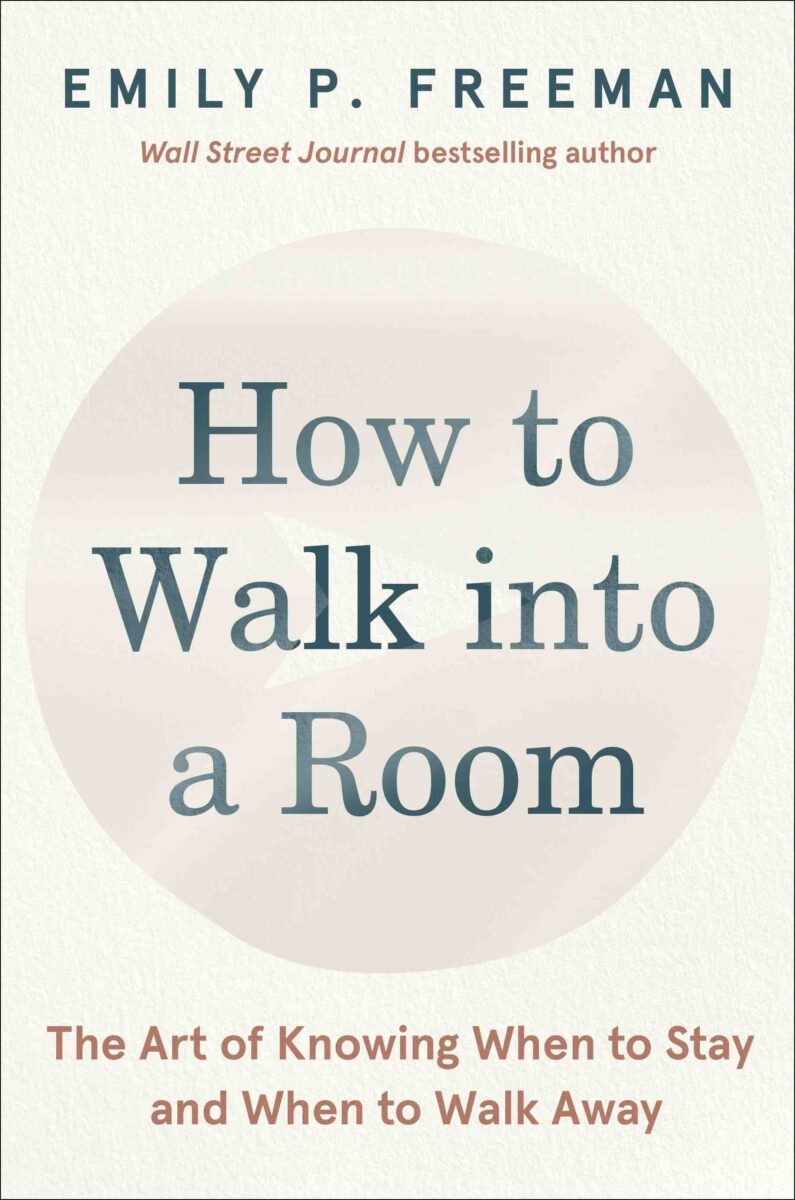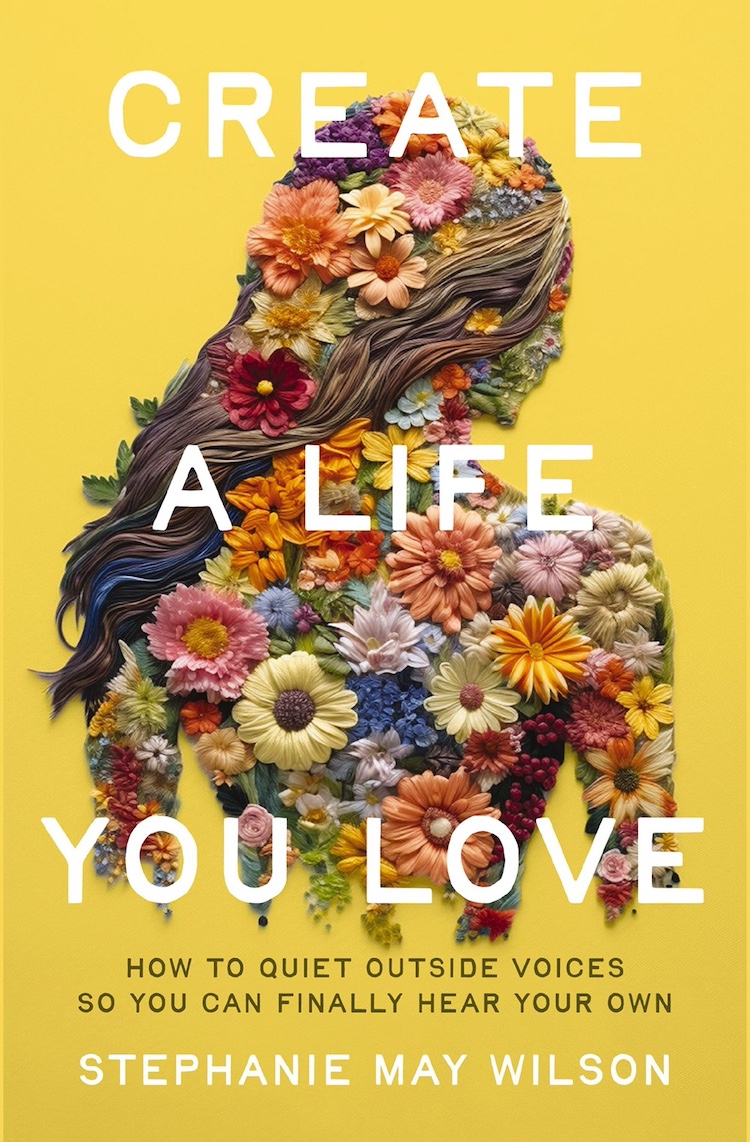Finding Stability and Peace in The Shifting Sands of Change: Emily P. Freeman and Stephanie May Wilson
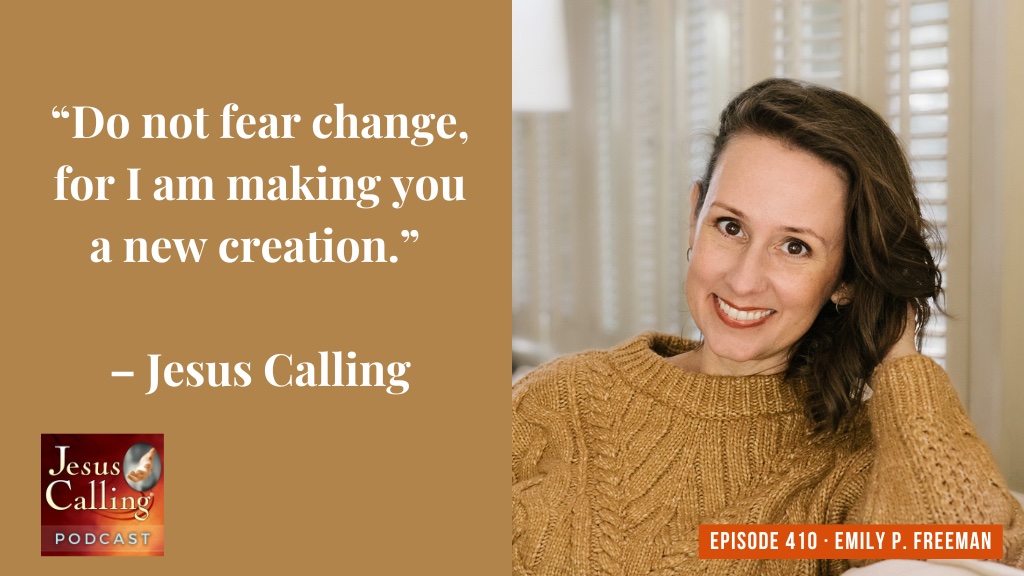
Emily P. Freeman: There have been many crossroads in my own life, and we probably all can look back on our lives and see times when we had a decision to make: whether or not it was time to leave, to try something new, or to stay where we were. And I’ve done both.
Finding Stability and Peace in The Shifting Sands of Change: Emily P. Freeman and Stephanie May Wilson – Episode #410
Narrator: Welcome to the Jesus Calling Podcast. There is an intricate dance between the difficulty of making changes in our lives and a profound trust in God to guide us through. When we have to make the decision to leave something behind and start anew, there is an emotional toll and a fear of the unknown. However, there is much to be learned from endings and new beginnings, and how sometimes we end up finding peace in the midst of our turmoil.
Emily P. Freeman is a spiritual director and author who hosts The Next Right Thing Podcast. Emily shares practical thoughts on how to navigate change, taken from her new book, How to Walk Into A Room: The Art of Knowing When to Stay and When to Walk Away. Stephanie May Wilson is a Tedx speaker, author, and podcaster who speaks to young adults who are facing crucial years where they will make some of their biggest life’s decisions, and advises them on how they can faithfully move forward by trusting God with their questions and their fears.
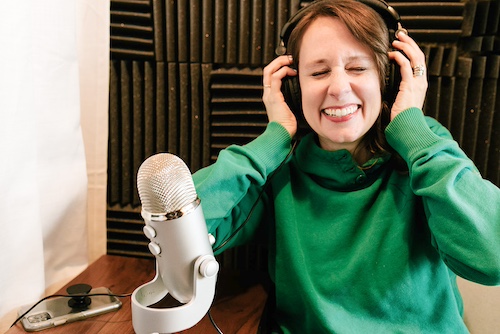
Let’s begin with Emily P. Freeman.
Emily P. Freeman: I’m Emily P. Freeman, and I am in North Carolina. I work as a spiritual director, an author, and a podcast host of the podcast The Next Right Thing.
Facing the Uncertainty of Change
Change is scary for all of us. And I would say there are different types of change that might be exciting. But probably for most of us, change can be really scary. And I would say that one of the reasons why life transitions and change in general can terrify us is because we don’t know what’s on the other side of the door. We know what we have. We know what we might potentially be leaving. And even if it’s not great, at least it’s known. But what we don’t know is what we’re going to see on the other side. And so I think a lot of us are afraid of uncertainty, and our minds are constantly scanning the future and scanning our bodies and scanning the room. Is it time for me to kind of dig in my heels and stay here longer and commit to this space? Or am I sensing it might be time for a change?
This idea of life being like a house is really helpful for me. And when I say that, I really do think of our various commitments, the communities that we might be a part of—it could be physical rooms, like a classroom if you’ve been a teacher for a really long time, or if you’ve been a student for a long time, or a brand new student. It could be your local gym or a faith community. A room could also be an ideology, like a political belief or a faith belief or something that you’ve just always thought is a certain way. And so there are different types of rooms, and these spaces, some of them are rooms that we were born into, speaking of like a faith community. Some people have been going to a particular church or faith gathering their entire life, and they didn’t really choose that room. That’s just sort of what they’ve known all along.
And then others of us, there might be rooms that we worked really hard to get into. For example, if we went to college for a particular skill or to practice a particular vocation, and then we walk into the room of our vocation, and that’s a place that we find ourselves. Part of our healthy human rhythm of life is leaving rooms and finding new ones. And a lot of times we accept that. We know that. And some of our endings are planned for and we circle them on the calendar, like graduations and weddings are types of endings. Sometimes they’re sad endings, like funerals or goodbyes, but those are all communal types of endings, and we all kind of recognize, like, Yeah, that thing was done, or That thing was sad that it ended. But we all agree.
But I think those rooms that I have left that have been the most difficult are ones where it could go either way, right? Where it could be, This is a decision that I had to make about whether or not the time was right. The idea of walking away from something known and maybe certain, even if the certainty is not great, can be really scary for a lot of us. And so I have a lot of compassion for anyone who is standing in the threshold of a room that they have been in for a really long time, and maybe feel a really deep sense of belonging, to walk out of that room into something that could be amazing and beautiful, but something that also might come with some risk.
“I have a lot of compassion for anyone who is standing in the threshold of a room that they have been in for a really long time, and maybe feel a really deep sense of belonging, to walk out of that room into something that could be amazing and beautiful, but something that also might come with some risk.” – Emily P. Freeman
How Can We Know It’s Time for a Change?
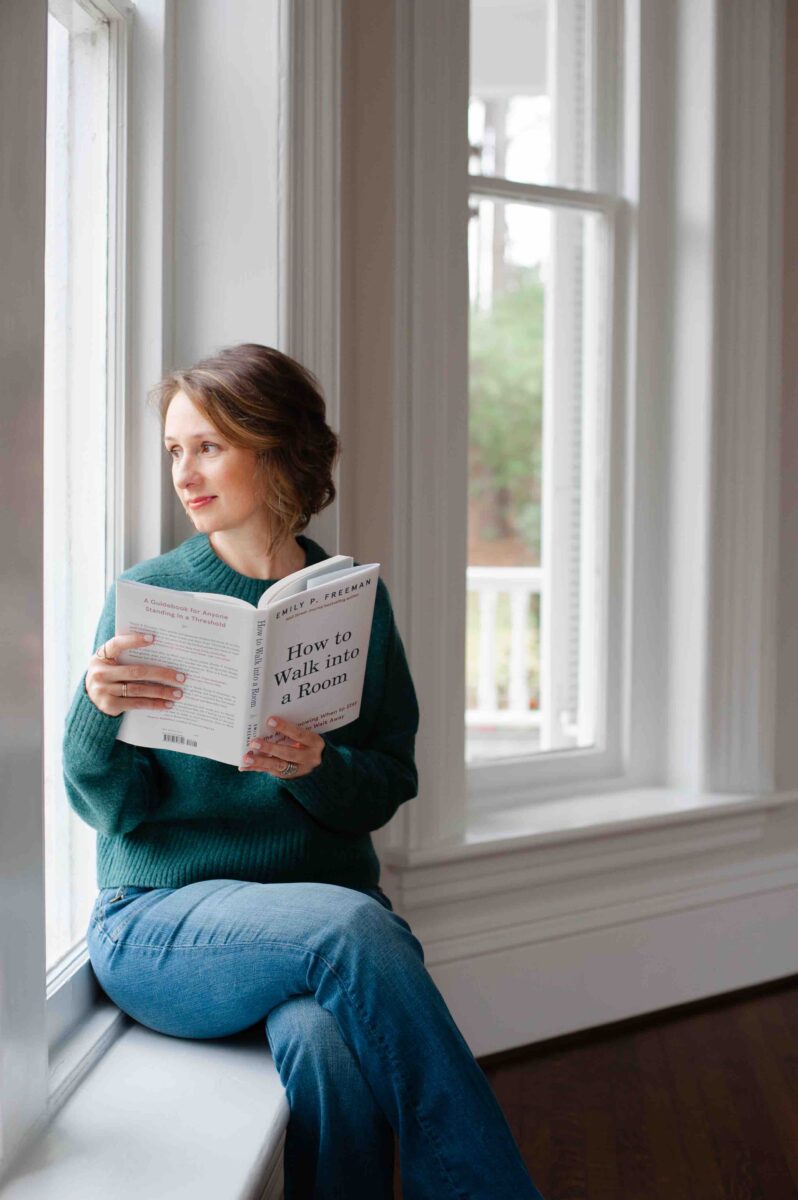
There are some things we do, some questions we can ask, that can help us know, Okay, well, is the time right? Is it for now or is it for later? And there’s a series of questions I like to ask, and I’ll just share a couple of them.
Ask yourself, Okay, I don’t know what to do right now, but I can at least enter into a practice of paying attention. And one of the ways to do that is to ask yourself, What are the corners or sections or people or parts of this room, this commitment, this group, whatever it is, that I’m avoiding? In other words, where are you hesitant to turn on the lights? Do you find yourself making excuses or concessions, or are you defending certain aspects of this room, either to yourself or to other people? How often are you doing that and what are those about?
Another question to ask yourself before you say, “Is it time to leave now or not?” is to say, “Well, where I am right now in this space, in this room, what is good and beautiful here?” And the reason why this question is important is even the rooms that we’re questioning may have parts that we love. That’s why you’re still here. That’s why this decision is difficult. And so naming and knowing and having your eyes wide open not just about what are the things I’m avoiding, but also, What’s working here? What do I absolutely love about this space? And if I were to walk away, what would I miss? What are the gifts that I would want to bring with me?
The reason why I love this question, especially when we’re talking about timing, is because if the time comes when you do discern, You know what? It is time for me to walk away, there is a human tendency that we have when we decide to leave a place to only highlight the terrible things about that space. To say, “Well, I’m leaving, and here’s all the reasons why, because this was too hard or this was difficult for me or this relationship wasn’t working for all these bad reasons.” But in reality, there is both beautiful and terrible in probably every space that we’re in. And so if we decide to walk away, I think it’s so good to do it with our eyes wide open, not just at the hesitations, but also to the gifts, so that we’re having a truer experience of not only the room, but also our leaving of it. That we can say, “You know what? There are good and beautiful things here. There were really hard things here. And I’m seeing all of it. And I’m walking out of this room with a true awareness of what the room was. It wasn’t all bad, and it wasn’t all good.”
“In reality, there is both beautiful and terrible in probably every space that we’re in. And so if we decide to walk away, I think it’s so good to do it with our eyes wide open, not just at the hesitations, but also to the gifts, so that we’re having a truer experience of not only the room, but also our leaving of it.” – Emily P. Freeman
Sometimes there are some decisions in life that we can make in a moment and we say, “Should I do this or that?” And we just know right away and we make it and it’s one step. But I would say most of the decisions that we make—specifically the ones about staying or leaving in spaces that we maybe loved or helped to build—it’s much less often that we ask the question and have an answer. More likely we are asking the question, and then we are following a series of arrows along the way. Another way of saying that is, “What is my next right thing? Is there just one next thing I can do today that can head me in a direction as best as I know right now, with the information that I have in front of me, with the person who I am today? I can do all of that in the presence of God.”
And so how our relationship with God comes into play here is knowing that if I’m a person of faith, if I am asking myself these questions and holding this tension, knowing that God is with me and aware of me, I mean, I truly believe God is always aware of us, that God is fully love and fully attentive and and God will not let us miss our own future. Which means that as I make my decisions, I’m not making them in a room by myself. That as I stand in thresholds, God’s Spirit is with me and around me and loving me and here with me. And God is not holding cause two cosmic hands behind God’s back, asking me to guess, “Which one do you think your future is in? You better guess right, or else you’re going to miss it.” I don’t think that’s the God that I know. And so when it comes to following arrows, it’s a matter of paying attention to the people who I can trust, who know me well. It’s looking back at my own life and, What can I learn from my past decisions I’ve made?
“I truly believe God is always aware of us, that God is fully love and fully attentive and and God will not let us miss our own future. Which means that as I make my decisions, I’m not making them in a room by myself.” – Emily P. Freeman
I always say the best indicators and teachers for our future good decisions are decisions we’ve already made, even some of the difficult ones, and maybe some of the ones that we feel like were a mistake. We can learn a lot from that. But all of those clues we can look to to discern, Okay, with God by my side, what is my next right thing? And as I make that move, here’s the key: even if I make a move in a direction that turns out terrible and I learn something from it, God was still with me. And in that move, I am becoming someone. Because what is infinitely more important than the decision that I make, ultimately, is the person who I am becoming as I make my decisions.
“Even if I make a move in a direction that turns out terrible and I learn something from it, God was still with me. And in that move, I am becoming someone. Because what is infinitely more important than the decision that I make, ultimately, is the person who I am becoming as I make my decisions.” – Emily P. Freeman
Finding Peace in Our Decisions
Often, for so many of us in our endings, the endings just didn’t turn out the way we thought, or something ended suddenly or in a way we didn’t expect. And so what do we do? How do we move forward when we are having to navigate an unexpected, messy, or uncomfortable ending?
Sometimes if an ending was uncomfortable, difficult, if difficult words were shared, you have to understand in an ending some of us are looking for the kind of closure that comes with being able to explain yourself. And I would just say gently if that is your story, that you may have to leave the story behind, because there were things said about you around tables that you were not invited to, and there were stories flying around your head that you will never be able to tie up all the loose ends. There may be people who still think things about you that are untrue, and if you are waiting to move forward in your life to find the kind of closure that comes with being able to explain yourself, you will be waiting a very long time, if not forever. And so we have to find a way with God by our side, to trust God with our reputation, and to believe wholeheartedly that there are things I can bring from this room. But the whole story and my own explanations is probably not going to be one of them.
I think a lot of us, you know, when we say, “What do you want more than anything else?” I think a lot of us would say, “I just want peace. If I could just have peace about my decisions, about where my kids are, about the faith community I’m a part of, about these rooms that I’m questioning… I’m just looking for peace.” And I have a lot of compassion for that desire. And I think that’s God’s desire for us, too. But my question would be, what is your definition of peace? And I think for some of us, our definition of peace is that we feel a sense of calm and safety and that there’s a lack of chaos. But in reality, sometimes doing the deeply right thing, following the silent arrows to our next right thing, can bring a lot of discomfort, can initially bring us some fear that rises up when you start to turn on the lights of a room that you’ve been in for a really long time. And your way of staying in that room was because you had to avoid some stuff, but now that you start turning on the lights and looking at stuff, you’re not gonna feel peace. You’re going to feel disrupted and uncomfortable. And I think our bodies tell us that’s a bad thing and you’re in danger. But discomfort is not the same as danger.
And I think that understanding and knowing that true peace is not the absence of discomfort or conflict, but it is an inner brokenness and an inner wholeness and an inner knowing that even though chaos may be all around me, I can still be aligned with what I know and who I am, I can live in congruence with my own core values, with my true identity, with the common good, with my life and God. And I think when we get quiet, when we take the time to get quiet and put maybe one hand on our heart and one hand on our belly, and listen to our lives as best we can in the presence of God, I think we know what inner peace feels like. And we also know what it feels like when we are afraid and we’re just avoiding being uncomfortable.
“True peace is not the absence of discomfort or conflict, but it is an inner brokenness and an inner wholeness and an inner knowing that even though chaos may be all around me, I can still be aligned with what I know and who I am, I can live in congruence with my own core values, with my true identity, with the common good, with my life and God.” – Emily P. Freeman
One of my favorite prayer practices is to practice a daily examination as I go to sleep at night. And I do this really informally just when I lay down my head—especially if I’m feeling anxious at the end of the day—to look back over the day and recognize where I noticed God and what God was up to in just regular moments of my everyday life. And I’ll say Jesus Calling is a resource that I turned to many, many years ago. And it was such a unique voice, with such a unique perspective of kind of playing with my imagination of what God might be saying in any particular situation on a particular day.
Jesus Listens, September 1st:
Glorious Savior,
Please fill me with Your Love, Joy, and Peace in ever increasing measure! These are Glory-gifts that flow from Your living Presence. I know I’m just an earthen vessel, but I rejoice that You designed me to overflow with Your heavenly contents. I’ve learned that my weakness is not a deterrent to being filled with Your Spirit. On the contrary, my inadequacy provides the perfect setting for Your Power to shine brighter.
As I walk with You through this day, help me to keep trusting You to provide the strength I need, moment by moment. I don’t want to waste my precious energy wondering whether I have enough stamina for today’s journey. Instead, I can rest in the knowledge that Your Spirit within me is more than sufficient to handle whatever comes my way.
Lord, You provide everything I need. In quietness (spending time alone with You) and confident trust (relying on Your adequacy) is my strength.
In Your powerful Name, Jesus,
Amen
Narrator: You can find Emily’s latest book, How to Walk into a Room: The Art of Knowing When to Stay and When to Walk Away, wherever you buy books.
Stay tuned to Stephanie May Wilson’s story after a brief message.
God Hears Your Prayers
In the days that are dark, where the news isn’t good, when we’re looking desperately for answers, or just looking to be heard, we just want someone to listen. Someone to hear our fervent prayers. More than ever, people need help. More than ever, people need hope. And more than ever, people need to know that they are heard.
Jesus Listens is a 365-day prayer devotional with short, heartfelt prayers based on Scripture, written to deepen your relationship with God. Learn more about Jesus Listens and download a free sample at www.jesuscalling.com/jesuslistens.
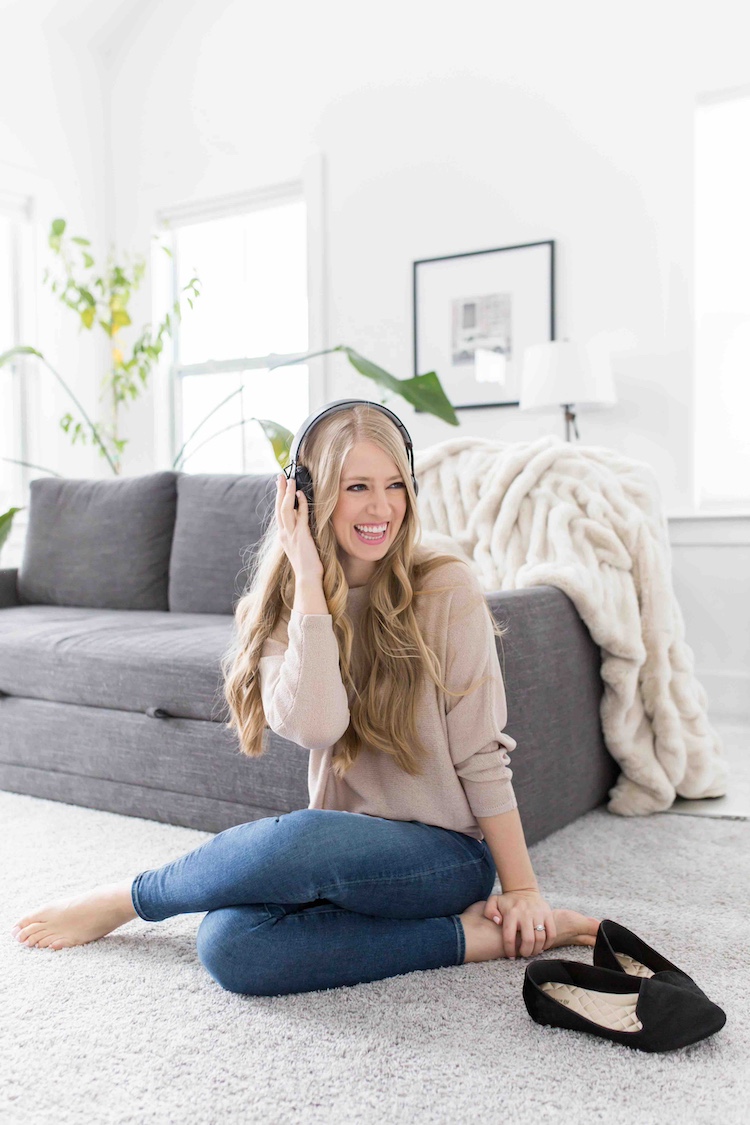
Our next guest is Tedx speaker, author, and podcaster Stephanie May Wilson, who shares the concept of the “everything era”—the period between ages twenty-five and thirty-five when we make most of our life’s biggest decisions, and how it can be easy to fall prey to external pressures and outside opinions. Stephanie shares how we can navigate this time by looking to God to bring us peace and assurance during this pivotal time in our lives.
Stephanie May Wilson: Hi there, I’m Stephanie May Wilson, and I am an author, a podcaster, and a speaker. And I am on a mission to be who I needed when I was younger, walking women through life’s biggest decisions and transitions.
Being Who We Needed When We Were Younger
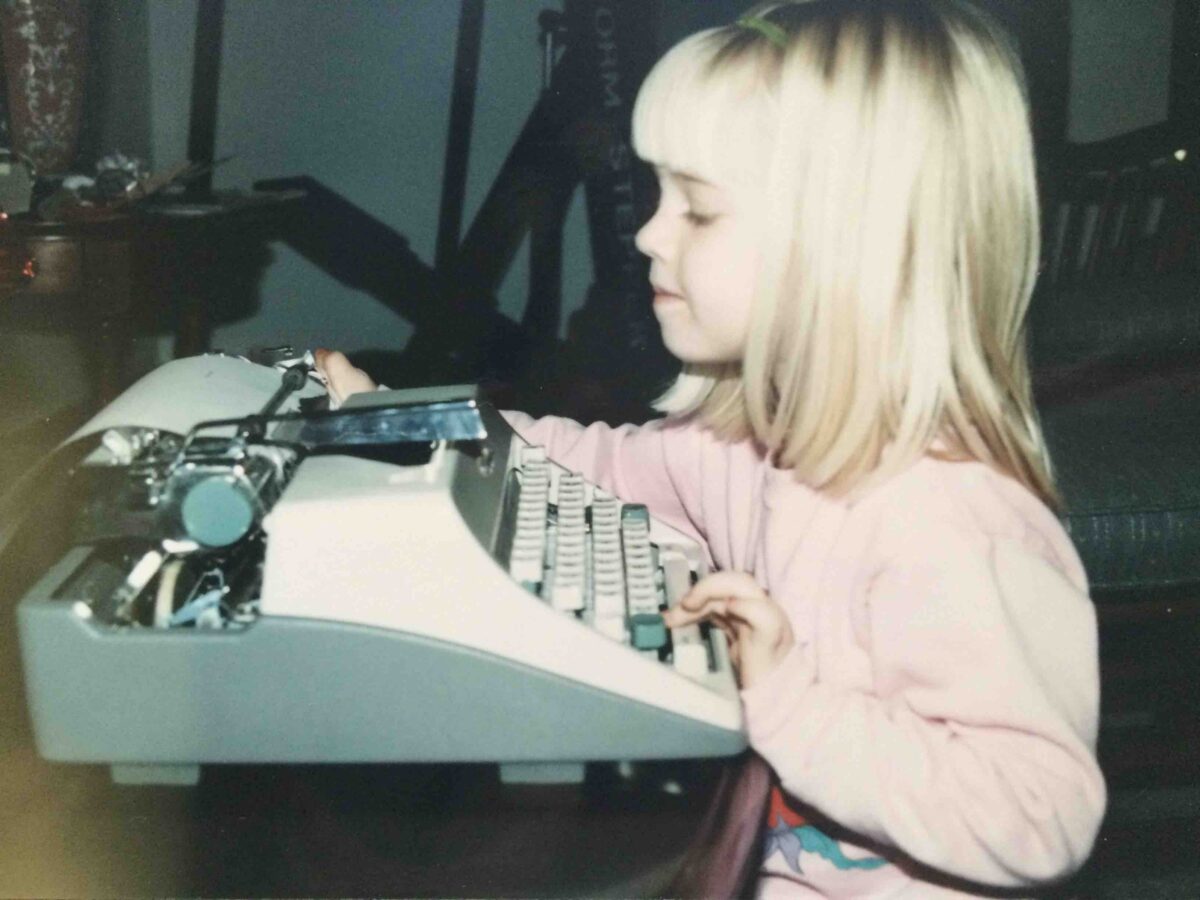
As I’ve gotten older, the things that my younger self has needed have changed along the way. But I think what I’ve needed along the way the whole time is a big sister. I am the eldest in my family and I love being a big sister, but I also totally wanted one. And I just wanted someone who really was a step and a half ahead of me in life, who I could flop down on her bed and ask her a million questions about everything, about life, about her faith and about makeup and about relationships and about work and jobs and how all the different pieces of life fit together and what she would do in any given situation.
So because I’ve always wanted that, I think I spent a lot of time growing up, really for years, looking for advice in books, from mentors, from all kinds of different places. I think what I was looking for was someone to tell me what to do in my life. What I actually needed—that I can see now—was someone to empower me to make decisions in my own life. And instead of looking outward for all these different answers about the right way to do things, to pause and look inward for a little while and see how you are made? What do you need? What do you want? What are you interested in? What lights you up? What do you feel like God is saying to you, not to everybody else?
Our Big Life Moments
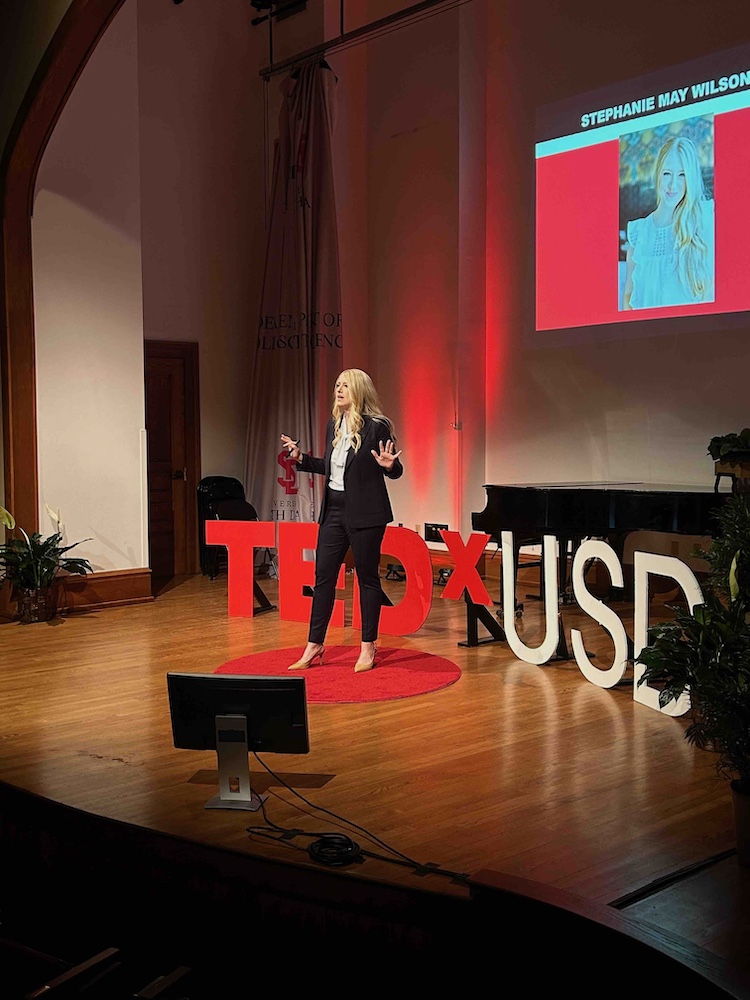
I’ve been writing and speaking and podcasting for over a decade at this point. And I’ve been walking women through all these different decisions and transitions in their life. And then I’ve also been going through so many in my mid twenties to mid thirties. I knew it was hard, but I didn’t know why it was so hard until I heard this statistic. It was a rare study of life span development that was done by researchers at Boston University and the University of Michigan, and they found that 80% of our life’s most significant moments happen before we turn thirty-five. And I was like, There is no way that’s true. How? Wait, what?
And I started to look into it and look into some of the biographically significant decisions. So, you know, when someone introduces you or even at the end of your life when someone goes, “This is who she was, this is what she did. This is who her partner was. These were her kids. This is where she lived. These were her friends,” like all those decisions.
There’s so much of life to be lived after thirty-five, of course, but a lot of these real trajectory changers happened before then. And so I wasn’t imagining it. This is actually as hard as it feels. The opinions really are everywhere. The pressures are everywhere. The expectations are everywhere.
So I started to dig into it more. And one of my big questions was like, “Why is this so hard and how can we make it easier?” And that sent me down this really, really deep rabbit hole.
Navigating the Everything Era
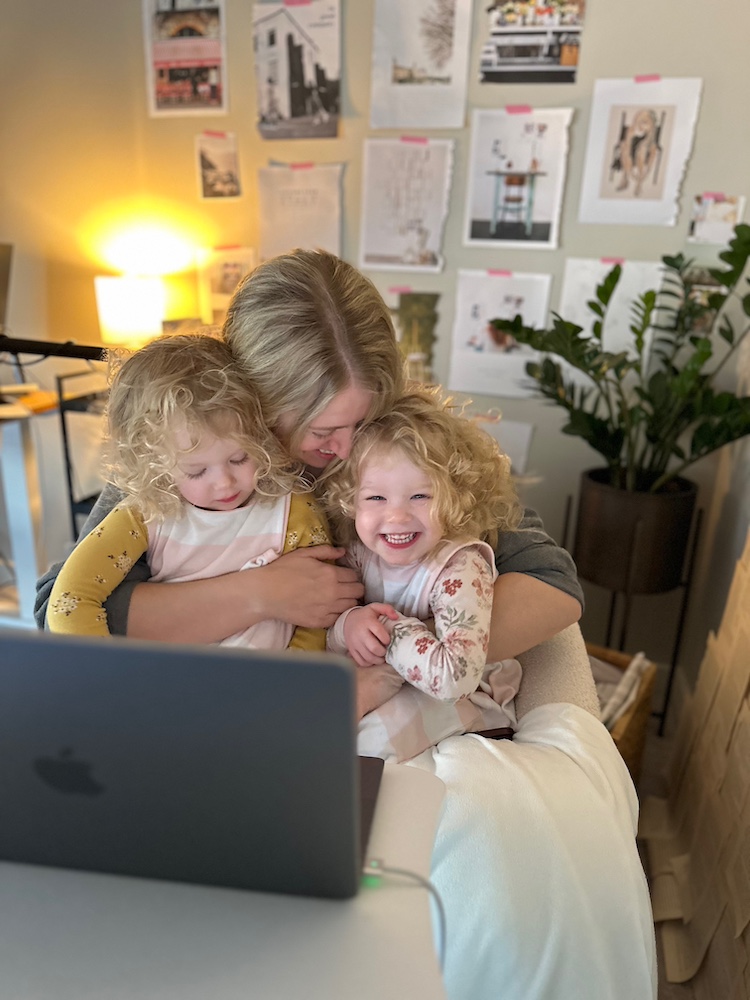
It’s such a weird time because everyone’s doing something different. People are at different places in their careers. Some people are living with their parents, some people are building a house, it’s just all over the board. I couldn’t find a name for that season of life. And it needs a name. It doesn’t work to call it a quarter life crisis, because it’s not really quarter life. We’re not midlife. We’re not post-grad anymore. We’re young and we’re adults, but young adults doesn’t really fit. And so I gave it a name, and I started calling it the ‘everything era’, because you’re making all these decisions all at the same time and in front of a massively opinionated audience.
The more that I learned about all those things, the more I realized we’re not alone in this. This isn’t an us problem. This isn’t a me problem. This is an all of us thing. We really are living under so many pressures. And so the ‘everything era’ really is this super tricky period of time where a bunch of different forces are pushing and pulling us in different directions, and where I think it leaves us constantly feeling like we’re falling short and falling behind.
“The ‘everything era’ really is this super tricky period of time where a bunch of different forces are pushing and pulling us in different directions, and where I think it leaves us constantly feeling like we’re falling short and falling behind.” – Stephanie May Wilson
And so what that looks like in daily life is you go to Thanksgiving and you are seated next to your Aunt Sharon, and you don’t want to be seated next to your Aunt Sharon because you know that she’s going to ask you about your relationship status or what college you’ve chosen or when you guys are finally going to have kids, or what you’re doing about childcare, if you’re breastfeeding. I mean, the Aunt Sharons of the world has so many opinions about our lives and makes them known.
I am a first born, type A, people pleaser, rule follower with anxiety. Like, this was not easy for me. Kind of some of the things that people say as you’re stepping into a new life season… when you’re getting married, people say things like, “Enjoy it now, because once the honeymoon season’s over, marriage is really hard.” I spent so long, especially while we were engaged, going, What am I supposed to do with that advice? And yes, relationships are hard. Being in a relationship with someone for your whole life, being a human for your whole life, is difficult. But I think I imagined that there was this sort of one exact thing about marriage that was hard, instead of it’s just hard like the rest of life is hard.
I was afraid that I was going to get it wrong. I just didn’t trust my own judgment. And so more than ever before I was scrambling. I was looking around asking for everybody’s opinion. I just was asking everybody for guidance and input. “Do you think this is right? What makes a good pair?”
Finally I was talking to a friend, spiraling, trying to figure out, Is he the one? Is this the person I want to spend my life with? And she put her hands on my shoulders and she almost shook me as she looked in my eyes and she said, “Stephanie, you get to decide.” I don’t know that I knew that before that day. I don’t know that I knew that I got to participate in my life. I felt like there was one exact right way to do it, and I had to figure it out. And if I couldn’t figure it out, then I was going to mess it all up. And I think that that’s a really big lie that I had to combat.
“I don’t know that I knew that I got to participate in my life. I felt like there was one exact right way to do it, and I had to figure it out. And if I couldn’t figure it out, then I was going to mess it all up. And I think that that’s a really big lie that I had to combat.” – Stephanie May Wilson
Another one, my husband and I were planning a trip to my favorite place in the world, which is Spain, and we were at a restaurant and we had all of our guidebooks spread out around us, and we were trying to put together our itinerary. And this couple leaned over from the table next to us and said, “Oh, you guys are going to Spain? That’s so fun. You guys must not have kids yet.” And we were like, “No, we don’t.” And they followed up with, “Well, I’m glad you’re traveling now because once you have kids, you won’t be able to.” And when I tell you that those words from people I didn’t even know sat on me and weighed on me and elaborated in my head about all the things I wasn’t going to be able to do after having kids, it was paralyzing.
We were married for a couple more years and then talked about the future of our family. And I remember my husband going, “Steph, when you talk about having kids, you talk about it like your life is going to be over.” I mean, I just didn’t even realize how deeply that random couple’s words had sunk into my soul and how many lies, really, it told me about what my life with kids was going to look like. It was like you have to leave your passport at the door of the hospital as you’re leaving with your kids and also your sense of self, your identity, any of your interests, your friends. You trade in your whole self for these kids. And granted, there’s a minute where you’re just in survival mode, but it’s not like that forever.
I started to learn that a beautiful life isn’t one size fits all, and that there are a whole bunch of different ways that life can be lived, that are all right and beautiful and good and God-approved.
“I started to learn that a beautiful life isn’t one size fits all, and that there are a whole bunch of different ways that life can be lived, that are all right and beautiful and good and God-approved.” – Stephanie May Wilson
I spent a long time in my faith praying for real, step-by-step instructions for what exactly to do next in just the littlest ways in my life, because I felt like if I could just follow God’s steps exactly, I would never get hurt. And that is not how it works. We know that we’re not promised a life without pain. We’re actually promised the opposite. Life on this earth and life as a believer, it’s hard. It’s not a walk in the park.
I found that because He loves me, He doesn’t give me step by step by step by step by step by step by step instructions. Instead, He is walking with me, and we come upon, like, three different paths that we could take. And He goes, “Which one do you want to take? I’ll be with you either way. They’re all good. What do you want to do?”
Use your mind, use your network, use the Holy Spirit that’s in you, use your experience to decide which of these you want to do. We’re not talking about a good versus a bad option here. We’re talking about a bunch of good options. But you need to decide which one you want to take. Because if you don’t, someone else will decide for you, or the world will decide for you, or circumstances will decide for you, or you’ll spend so much time trying to decide that you miss the chance to decide all together. We have to decide. And we get to decide. And that’s a really beautiful thing.
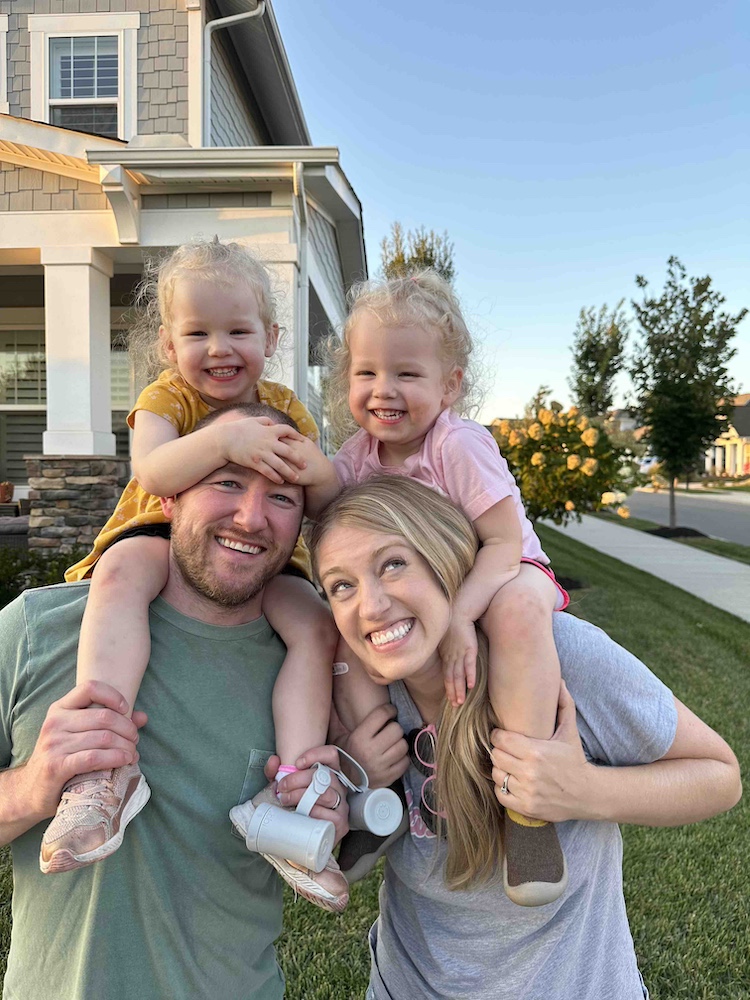
We’re getting to really prove the fact that that’s true, because we are moving to Spain with our family. It turns out kids can travel, too. Kids live in all kinds of countries, and yours can too. That was a really, really big hurdle for me to overcome, but once I was able to overcome it and remind myself that just because someone told me it was supposed to be one way doesn’t mean they’re 100% right, I feel like I was able to step into motherhood, but motherhood as me, and also this adventure that we’re about to go on.
God’s Word Helps Us Keep Our Eyes on the Prize
Spending time with God is an incredibly important tool for really keeping our eye on the prize. But I also think that the pre-dreaming, the pre-planning, like, creating your own definition of success and really identifying what voices you do want to listen to, I think makes it so much easier when you have other voices that sort of butt in to try to tell you something different.
Jesus Calling has been such a big part of my life and my time with God. I think that those are some really important tools: time with God, knowing who you listen to—which helps you know who you aren’t going to listen to, who doesn’t fall in that circle—and then defining success for yourself makes it a lot easier to quiet some of those outside voices.
Jesus Listens, August 13th:
Magnificent Jesus,
Living in dependence on You is a glorious adventure! Most people scurry around busily, trying to accomplish things through their own strength and ability. Some succeed magnificently; others fail miserably. But both groups miss what life is meant to be: living and working in collaboration with You. Please train me to depend on You more and more, Lord.
When I depend on You, my whole perspective changes. I’m able to see Your miraculous works, though others see only natural occurrences and “coincidences.” I begin each day with joyful expectation, eager to see what You will do. I accept weakness as a gift from You, knowing that Your Power is fulfilled and completed—shows itself most effective—in my weakness. I keep my plans tentative, trusting that Your plans are far superior. I consciously live, move, and have my being in You, rejoicing that You live in me.
How marvelous it is to know that I am in You, and You are in me! Thank You for this intimate adventure of sharing my life with You.
In Your exhilarating Name,
Amen
Narrator: To learn more about Stephanie, follow her on social media, and be sure to check out her new book, Create A Life You Love, available at your favorite retailer.
If you’d like to hear more stories about how to navigate change with the help of faith, check out our interview with Reba McEntire.
Next week: Jesse Hutch
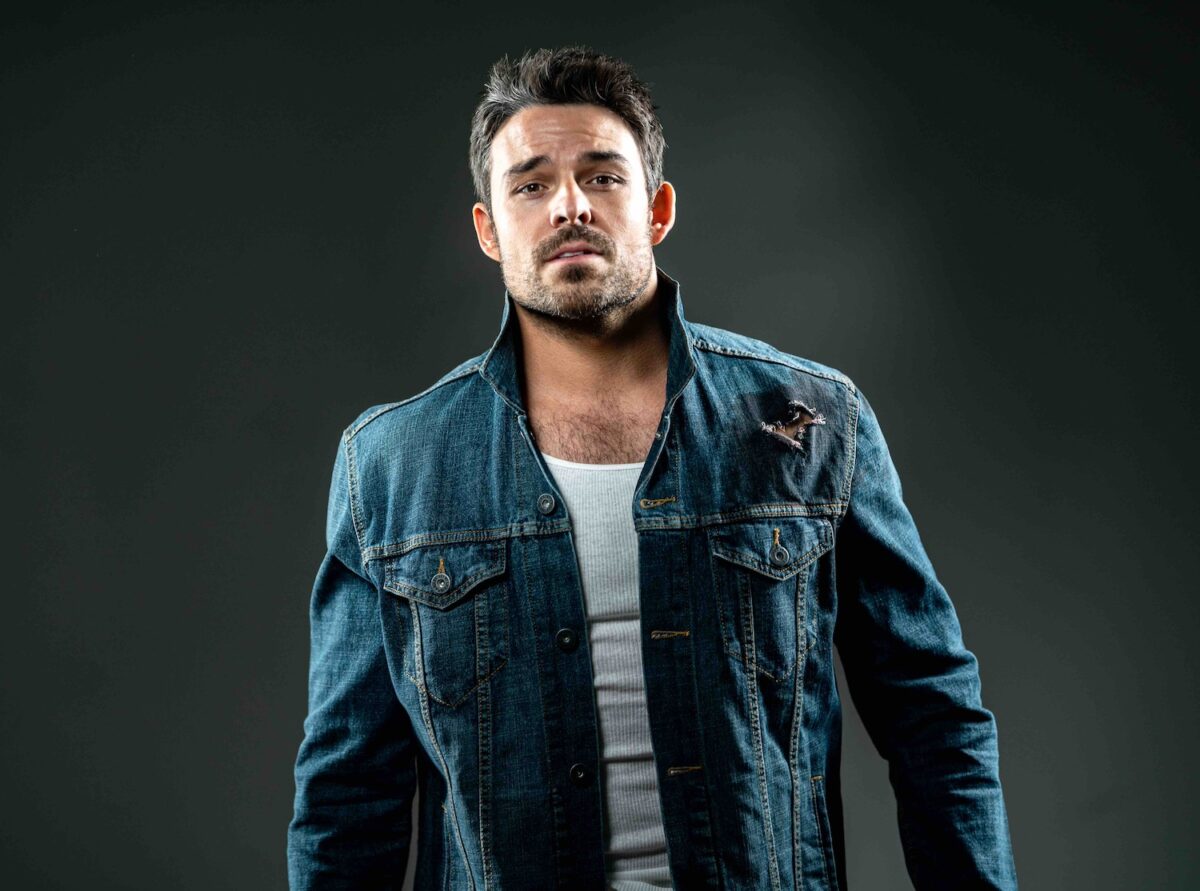
Next time on the Jesus Calling Podcast, we’ll hear from actor Jesse Hutch, who shares how faith acts as a base that centers each decision he makes.
Jesse Hutch: If you’re going to build a house, you don’t build it on sand, right? You want to make sure you have a solid foundation. And the Bible talks about that. I’m imperfect, I don’t have it all together. There’s always something to give to the Lord and to improve on and to ask for help with.
